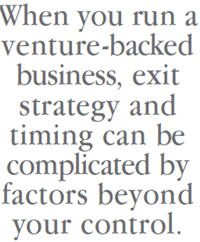Do You Have An Exit Strategy?
By Robert Biggs and Jacob Guzman, financial advisors and corporate client group directors, Morgan Stanley
 An entrepreneur invests years, if not decades, of selfless dedication and hard work into their business in hopes of creating significant value for themselves and for investors. However, once it comes time to plan for an exit, we have found that entrepreneurs and executives are often unfamiliar with the complexities of the process and the meticulous preparation necessary for a successful outcome.
An entrepreneur invests years, if not decades, of selfless dedication and hard work into their business in hopes of creating significant value for themselves and for investors. However, once it comes time to plan for an exit, we have found that entrepreneurs and executives are often unfamiliar with the complexities of the process and the meticulous preparation necessary for a successful outcome.
You will begin to think of an exit strategy and time frame as your life sciences company grows and develops. However, as most successful entrepreneurs can attest, the path to an exit is seldom straight, and the ideal strategy can be both fluid and elusive. Given the variability of the outcome, it is important to prepare and execute a personal plan as early as possible in order to maximize the exit’s value. The most bittersweet call that we can receive from a client is the one that says, “I sold my company; let’s start implementing all of the planning that we have been discussing for the last several years.” While every situation is different, our hope is to provide a road map — using best practices — as you begin to think through an exit strategy and position yourself and your business for a successful outcome.
Where to Start?
Many people will tell you about the importance of surrounding yourself with good people, which seems clichéd. But what type of people? At the very least, your team ought to include a financial advisor, an estate planning attorney, an accountant, an investment banker, and a corporate attorney. Each of your advisors should have an understanding of your industry and your business to ensure that you receive the best-informed advice. Surround yourself with specialists, not generalists.
For example, when we met Matt Rhodes-Kropf, he was working as CFO for Avid Radiopharmaceuticals. Morgan Stanley eventually helped sell Avid to Eli Lilly in the fall of 2010. “Surrounding yourself with a team of trusted advisors as early as possible can be helpful in alleviating many of the issues that arise as a deal approaches,” says Rhodes- Kropf, currently professor of venture capital at Harvard Business School. Think of this as assembling your personal board of directors. You can draw on their expertise, while you focus on maximizing the value of your business. As a deal approaches, you need your team to proactively collaborate on your behalf, rather than simply respond to your requests.
While each advisor serves a distinct purpose, open communication amongst your advisors is a key element for success. As your deal approaches, there are a number of important decisions that can impact its long-term success, both for you and the company. Proper planning will help you maximize value for yourself as well as for shareholders.
all investors have the ultimate goal of maximizing the value of their investment, there are other objectives that may come into play as well. If you have multiple investors, take the time to understand all of your investors’ goals from the beginning. When you run a venture-backed business, exit strategy and timing can be complicated by factors beyond your control, so it is even more important to speak with your company’s board early and often to understand its goals and desires for the business. While there are a number of different exit paths, it is best to learn about these differences early on and to do whatever it takes to align your strategy with your investors’ goals. “We believe that discussing a company’s exit strategy with management, existing investors, and new investors is an essential step prior to ensuring that all parties are properly aligned,” says Scott Weiner, transactional partner at Pappas Ventures, a Durham, NC-based life sciences venture capital firm. Morgan Stanley recently helped take TESARO, an oncology-focused biopharmaceutical company and Pappas Ventures investment, through an initial public offering.
Sometimes, an investor will choose to be passive or want to sell its investment earlier. This situation presents an opportunity for other investors to buy out the noncommitted investor, simplifying the management structure and ensuring that everyone moving forward is committed and unified. Once everyone is committed, it is time to form the company that buyers can see themselves owning. A business should be built to be acquired, not to be sold.
 An Exit On The Horizon
An Exit On The Horizon
Our experience shows that entrepreneurs can be reluctant to think about an exit two to three years in advance. However, this is exactly the point at which you can leverage some of the best strategies as they relate to taxes and your estate. It is important to review asset titling and ownership as well as your current wealth management and estate plans at that time. A full understanding of liability issues and the treatment of assets in a lawsuit or upon death may help to uncover problems that need to be addressed when updating your financial and estate plans.
Additionally, in light of the possible upcoming liquidity event, the structure of ownership itself may need to be reviewed. Trying to update and review your wealth management and estate strategies during business negotiations is particularly difficult, due to the focus and commitment required by the management of the deal itself. Take the time now to figure out how much money you require to attain your retirement lifestyle goals. Forethought will help reduce stress, increase investor commitment, and guide the negotiation process. Now is your best opportunity to coordinate with your financial advisor and estate attorney to determine what strategies make sense for you and to implement them. “Our research shows many entrepreneurs are typically not proactive in this area until the second or third venture, and often regrettably so,” remarks Joseph Romano, executive director, wealth planning specialist and strategic partner to the CES Group at Morgan Stanley. Remember that many strategies require significant time to be effective in protecting and transferring wealth (i.e. establishing trusts, LLCs, and leveraging discounts on gifts).
“When you are within two years of a potential exit, it is essential you continue to execute your strategic plan so that buyers can envision taking over easily and s m o o t h l y , ” says Fahd Riaz, Philadelphiabased partner in the Business and Finance Practice and member of the Life Sciences Transactions Practice at Morgan, Lewis & Bockius, LLP. Engaging an investment banker early in the process allows investors to evaluate multiple exit strategies through a “strategic alternatives analysis.” More often than not, venture-backed businesses take a dual-track approach by preparing their companies for either an acquisition or an initial public offering. Keeping your options open may help to attract a larger pool of potential buyers and/or investors, which will help to maximize shareholder value. An investment banking group that knows your industry and focuses on transactions within your expected deal size can be helpful in identifying buyers and can help position your company for its ideal exit. Use the specialists you hire to help familiarize your executive team with the process, negotiation points, and priorities.

As you prepare to formally begin negotiations, it is essential that your team understands the need to maintain confidentiality and focus on the task at hand. Personally, this is one of your last opportunities to complete any gifting/transfer strategies, as well as to create a list of the things you need to do in order to stay focused. Be sure you fully understand your key negotiation points and expectations for a deal. Life will quickly become busy and hectic, and this time of calm, when you have a team of trusted advisors working on your behalf, will truly pay dividends. Lean heavily on your advisors and be sure that you delegate work appropriately in order to make effective use of their expertise.
Life After An Exit
Once your deal is announced, you will be overwhelmed by “new friends” and people wanting to help you with your newfound wealth. It is important to remember that there is no rush. Your financial advisor will assist you in developing shortterm investment strategies which will allow you time to relax, reevaluate your goals, and plan properly before you jump into new investment strategies. Despite what you will hear from a variety of sources, there is no such thing as a ”too-good-to-pass- up” investment.
Once you have had the opportunity to recover, it is important to revisit your comprehensive wealth management strategy to assure that it remains in line with your family’s long-term goals. By incorporating your accountant, estate attorney, and wealth advisors, you can put together a plan that best suits your future needs. Some key areas to consider as you look ahead are tax, estate, and wealth protection planning.
Guiding a company up to and through an exit can be overwhelming. It is essential that entrepreneurs surround themselves with a strong team of advisors who are specialists in their respective fields. By delegating early and effectively, entrepreneurs can focus on what is most important: driving value for themselves and their investors. By preparing a personal plan early, and updating it often, entrepreneurs can maximize value through hard work, focus, and dedication, creating the best possible outcome for all parties involved.
